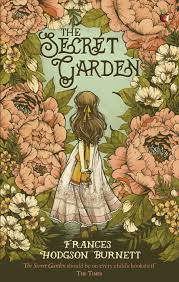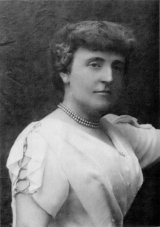The Secret Garden Page #14
The Secret Garden is a novel by Frances Hodgson Burnett first published in book form in 1911, after serialization in The American Magazine. Set in England, it is one of Burnett's most popular novels and seen as a classic of English children's literature. Several stage and film adaptations have been made.
“What will they be?” asked Mary. “Crocuses an’ snowdrops an’ daffydowndillys. Has tha’ never seen them?” “No. Everything is hot, and wet, and green after the rains in India,” said Mary. “And I think things grow up in a night.” “These won’t grow up in a night,” said Weatherstaff. “Tha’ll have to wait for ’em. They’ll poke up a bit higher here, an’ push out a spike more there, an’ uncurl a leaf this day an’ another that. You watch ’em.” “I am going to,” answered Mary. Very soon she heard the soft rustling flight of wings again and she knew at once that the robin had come again. He was very pert and lively, and hopped about so close to her feet, and put his head on one side and looked at her so slyly that she asked Ben Weatherstaff a question. “Do you think he remembers me?” she said. “Remembers thee!” said Weatherstaff indignantly. “He knows every cabbage stump in th’ gardens, let alone th’ people. He’s never seen a little wench here before, an’ he’s bent on findin’ out all about thee. Tha’s no need to try to hide anything from him.” “Are things stirring down below in the dark in that garden where he lives?” Mary inquired. “What garden?” grunted Weatherstaff, becoming surly again. “The one where the old rose-trees are.” She could not help asking, because she wanted so much to know. “Are all the flowers dead, or do some of them come again in the summer? Are there ever any roses?” “Ask him,” said Ben Weatherstaff, hunching his shoulders toward the robin. “He’s the only one as knows. No one else has seen inside it for ten year’.” Ten years was a long time, Mary thought. She had been born ten years ago. She walked away, slowly thinking. She had begun to like the garden just as she had begun to like the robin and Dickon and Martha’s mother. She was beginning to like Martha, too. That seemed a good many people to like—when you were not used to liking. She thought of the robin as one of the people. She went to her walk outside the long, ivy-covered wall over which she could see the tree-tops; and the second time she walked up and down the most interesting and exciting thing happened to her, and it was all through Ben Weatherstaff’s robin. She heard a chirp and a twitter, and when she looked at the bare flower-bed at her left side there he was hopping about and pretending to peck things out of the earth to persuade her that he had not followed her. But she knew he had followed her and the surprise so filled her with delight that she almost trembled a little. “You do remember me!” she cried out. “You do! You are prettier than anything else in the world!” She chirped, and talked, and coaxed and he hopped, and flirted his tail and twittered. It was as if he were talking. His red waistcoat was like satin and he puffed his tiny breast out and was so fine and so grand and so pretty that it was really as if he were showing her how important and like a human person a robin could be. Mistress Mary forgot that she had ever been contrary in her life when he allowed her to draw closer and closer to him, and bend down and talk and try to make something like robin sounds. Oh! to think that he should actually let her come as near to him as that! He knew nothing in the world would make her put out her hand toward him or startle him in the least tiniest way. He knew it because he was a real person—only nicer than any other person in the world. She was so happy that she scarcely dared to breathe. The flower-bed was not quite bare. It was bare of flowers because the perennial plants had been cut down for their winter rest, but there were tall shrubs and low ones which grew together at the back of the bed, and as the robin hopped about under them she saw him hop over a small pile of freshly turned up earth. He stopped on it to look for a worm. The earth had been turned up because a dog had been trying to dig up a mole and he had scratched quite a deep hole. Mary looked at it, not really knowing why the hole was there, and as she looked she saw something almost buried in the newly-turned soil. It was something like a ring of rusty iron or brass and when the robin flew up into a tree nearby she put out her hand and picked the ring up. It was more than a ring, however; it was an old key which looked as if it had been buried a long time. Mistress Mary stood up and looked at it with an almost frightened face as it hung from her finger. “Perhaps it has been buried for ten years,” she said in a whisper. “Perhaps it is the key to the garden!” CHAPTER VIII THE ROBIN WHO SHOWED THE WAY She looked at the key quite a long time. She turned it over and over, and thought about it. As I have said before, she was not a child who had been trained to ask permission or consult her elders about things. All she thought about the key was that if it was the key to the closed garden, and she could find out where the door was, she could perhaps open it and see what was inside the walls, and what had happened to the old rose-trees. It was because it had been shut up so long that she wanted to see it. It seemed as if it must be different from other places and that something strange must have happened to it during ten years. Besides that, if she liked it she could go into it every day and shut the door behind her, and she could make up some play of her own and play it quite alone, because nobody would ever know where she was, but would think the door was still locked and the key buried in the earth. The thought of that pleased her very much. Living as it were, all by herself in a house with a hundred mysteriously closed rooms and having nothing whatever to do to amuse herself, had set her inactive brain to working and was actually awakening her imagination. There is no doubt that the fresh, strong, pure air from the moor had a great deal to do with it. Just as it had given her an appetite, and fighting with the wind had stirred her blood, so the same things had stirred her mind. In India she had always been too hot and languid and weak to care much about anything, but in this place she was beginning to care and to want to do new things. Already she felt less “contrary,” though she did not know why. She put the key in her pocket and walked up and down her walk. No one but herself ever seemed to come there, so she could walk slowly and look at the wall, or, rather, at the ivy growing on it. The ivy was the baffling thing. Howsoever carefully she looked she could see nothing but thickly growing, glossy, dark green leaves. She was very much disappointed. Something of her contrariness came back to her as she paced the walk and looked over it at the tree-tops inside. It seemed so silly, she said to herself, to be near it and not be able to get in. She took the key in her pocket when she went back to the house, and she made up her mind that she would always carry it with her when she went out, so that if she ever should find the hidden door she would be ready.
Translation
Translate and read this book in other languages:
Select another language:
- - Select -
- 简体中文 (Chinese - Simplified)
- 繁體中文 (Chinese - Traditional)
- Español (Spanish)
- Esperanto (Esperanto)
- 日本語 (Japanese)
- Português (Portuguese)
- Deutsch (German)
- العربية (Arabic)
- Français (French)
- Русский (Russian)
- ಕನ್ನಡ (Kannada)
- 한국어 (Korean)
- עברית (Hebrew)
- Gaeilge (Irish)
- Українська (Ukrainian)
- اردو (Urdu)
- Magyar (Hungarian)
- मानक हिन्दी (Hindi)
- Indonesia (Indonesian)
- Italiano (Italian)
- தமிழ் (Tamil)
- Türkçe (Turkish)
- తెలుగు (Telugu)
- ภาษาไทย (Thai)
- Tiếng Việt (Vietnamese)
- Čeština (Czech)
- Polski (Polish)
- Bahasa Indonesia (Indonesian)
- Românește (Romanian)
- Nederlands (Dutch)
- Ελληνικά (Greek)
- Latinum (Latin)
- Svenska (Swedish)
- Dansk (Danish)
- Suomi (Finnish)
- فارسی (Persian)
- ייִדיש (Yiddish)
- հայերեն (Armenian)
- Norsk (Norwegian)
- English (English)
Citation
Use the citation below to add this book to your bibliography:
Style:MLAChicagoAPA
"The Secret Garden Books." Literature.com. STANDS4 LLC, 2024. Web. 25 Nov. 2024. <https://www.literature.com/book/the_secret_garden_427>.




Discuss this The Secret Garden book with the community:
Report Comment
We're doing our best to make sure our content is useful, accurate and safe.
If by any chance you spot an inappropriate comment while navigating through our website please use this form to let us know, and we'll take care of it shortly.
Attachment
You need to be logged in to favorite.
Log In